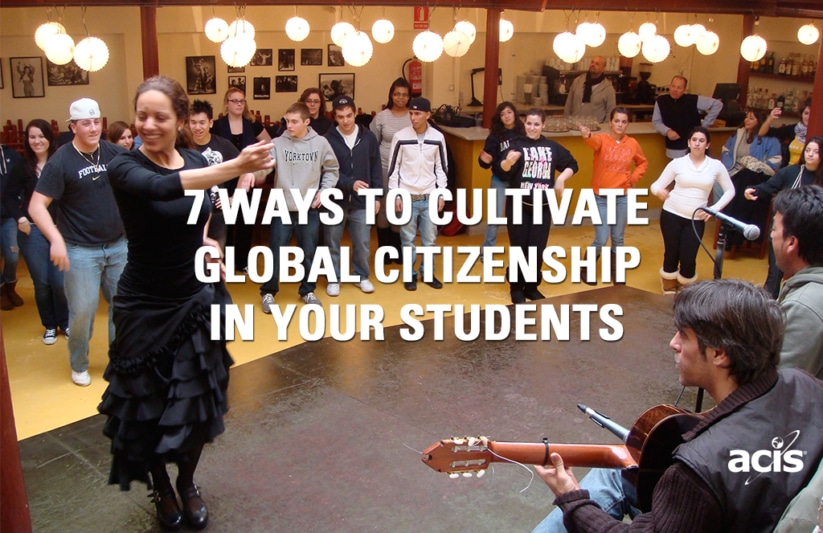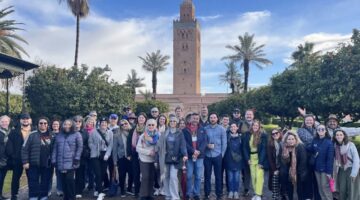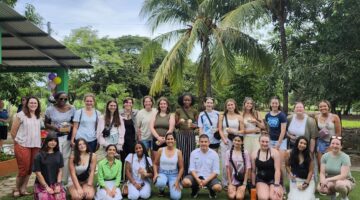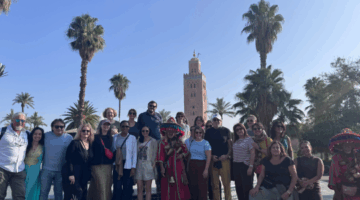7 Ways to Cultivate Global Citizenship in Your Students

Day after day, year after year, our world becomes increasingly globalized. Whether we live in a bustling, cosmopolitan city or a secluded country town, we can communicate with and thus make an impact on communities and individuals all over the world. At ACIS, we subscribe to the belief that every time a student’s perspective is shifted globally, so does their ambition. We’re excited to take part in the global movement to imbue the generation of students coming of age in this era of globalization with a sense of citizenship and perspective such that they’ll take their share of responsibility of their global community.
Here are 7 ways to encourage your students to become global citizens:
1. Assign a Globally Minded Project
It can be a self-fulfilling prophecy when kids believe they can’t affect the problems facing the world. Sometimes all it takes is making them believe they can make an impact to inspire them to do something amazing. No matter what subject you teach, you can assign your students a project that challenges them to find an issue facing the global community (or their local community) and propose a solution that can help make things better. In the words of Henry Ford, “If you think you can, or you think you can’t, you’re right.”
2. Volunteer
Volunteering your time to help a worthy cause has a ripple effect throughout a young person’s life. From instilling a sense of gratitude and perspective, to meeting new people, to building new skills, the list goes on and on. There are many ways and organizations that provide chances to volunteer abroad, but there are also plenty of ways to volunteer in your hometown. In today’s day and age, refugee communities exist all over the country, and organizations exist all over the country to help settle them. Being a global citizen is about playing an active role in your global community. That could be on the micro or macro scale.
3. Go to an International Festival
If your students live in a town with a diverse international population, then there are probably annual or semi-annual festivals celebrating the diversity of your community in a variety of ways. Perhaps it’s a multi-cultural festival where several different national and ethnic communities are represented, or perhaps it’s a single nationality like a Greek or Puerto Rican Day Festival. If you live in a small town where festivals like those don’t happen very often (or at all), there’s probably a town within a couple hours drive away where they do. Organizing a group trip could be a great way to build up the momentum among your students to drive global awareness and sensitivity.
4. Start a Cultural Awareness Club/Host a Cultural Day at School
Many schools have a French Club, Italian Club or Spanish Club, but some schools take it one step further and have an International Club. Depending on the size of your school, perhaps you could do both, but exploring either path gives your students a chance to celebrate diversity and explore foreign cultures. Organizing events like music/dance performances and themed parties on an ongoing basis or in one large day-long summit are a great way to raise the visibility and profile of the clubs. Giving students the chance to play an organizational role is also a great chance to build leadership skills.
5. Go to an Ethnic Restaurant/Host a Potluck
Very few things bridge a cultural gap like food. What more vivid examples of culture exist than a good ethnic meal? I’ll never forget the first time I ate Ethiopian food. Eating with my hands and having no idea what to expect was such an enlightening experience. I was so inspired to learn more about Ethiopia, its history and its culture from that one meal! The same effect could happen from a Peruvian restaurant experience, or Korean, Indian, etc. etc.
6. Take on a Service Learning Project
Service learning projects take the transformational power of educational travel one step further by giving participants the chance to actively contribute to a local community in a significant way. Service learning educates and engages participants while at the same time helps a community in need. While taking on service learning projects away from your home country and community can be especially transformational, there are plenty of ways to get involved in your own hometown.
7. Travel Abroad
There’s no better way to become more globally conscious than traveling. It’s without a doubt the best way to gain a new perspective on the world at large as well as your community at home. My first trip abroad was to France when I was in high school and then my second was to Kenya in college. Both trips broadened my perspective in so many ways, and each time, I returned with insights and perspectives about the world and my place in it. As young people grow up, attend college, and think about their careers, traveling abroad can have an exponentially positive influence on their future.
Is teaching Global Citizenship a priority at your school? How do you incorporate it into your curriculum? Let us know in the comments section below!











This is a fantastic addition to the new Global Citizenship Curriculum! A new slide for the power point!
Pam Skaar Meier
ATA Minnesota
Group Leader Eden Prairie HS
We just talked about this very topic yesterday during an all-faculty meeting! Thank you!
Hi! My name is Kip Cates and I edit a “Global Issues in Language Education Newsletter” for the non-profit Japan Association for Language Teaching (JALT) https://jalt.org .
I found Marc Amigone’s great article on “7 Ways To Cultivate Global Citizenship” on your website https://acis.com/blog/7-ways-to-cultivate-global-citizenship-in-your-students/ and would like to reprint this in my newsletter for teachers in Japan. Of course, I would cite the source and add a sidebar promoting EACIS with the article.
Can you give me permission to reprint? Thanks for a quick answer. Best wishes from Japan! – Kip Cates
Hi Kip, We’d love to help teachers in Japan cultivate global citizenship in their classrooms, you may print! And, I’m sure this was just a typo, but please do cite ACIS, http://www.acis.com. You can learn more about our mission to change lives through educational travel here https://acis.com/about/